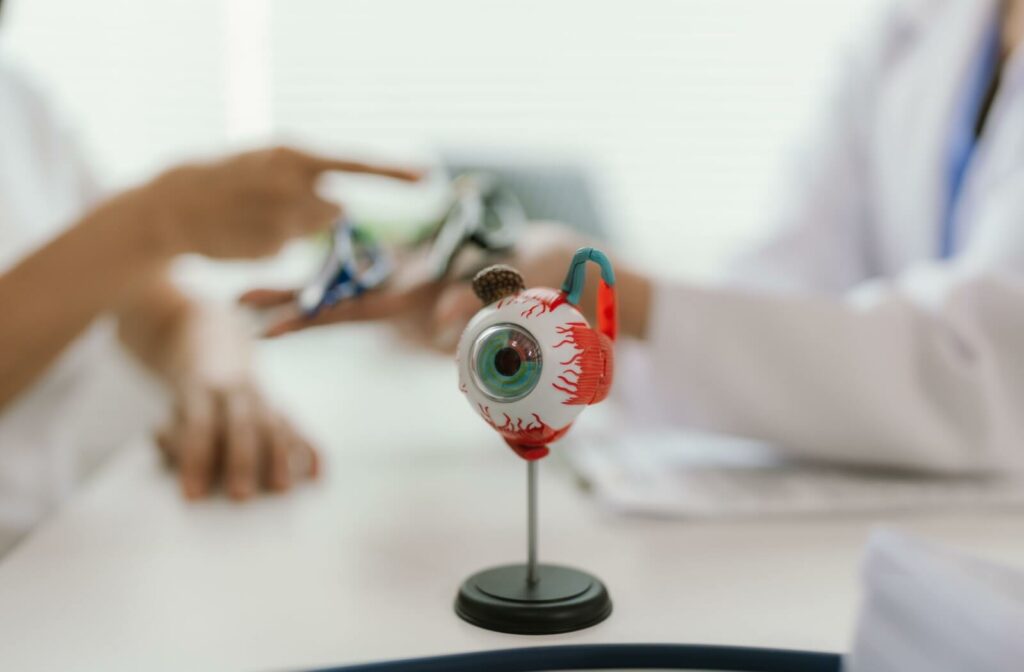Your eyes offer a direct look at your blood vessels, nerves, and connective tissues. That’s why a comprehensive eye exam can spot early signs of health conditions that appear in the eye before you notice symptoms anywhere else.
In fact, a comprehensive eye exam can help detect early signs of general health conditions like diabetes, high blood pressure, and even certain autoimmune diseases. Regular appointments are a proactive way to maintain your long-term wellness, so understanding the recommended frequency for eye exams is key.
More Than a Simple Vision Check
A vision screening, like one you might take at school or the DMV, is different from a comprehensive eye exam. A screening only checks how well you see from a distance. A full exam done by an eye doctor checks the complete health of your eyes, from front to back.
Many serious health conditions don’t have obvious signs in their early stages, which makes early detection so important. An eye exam can help identify these issues before they become larger problems.
Cardiovascular Conditions & Your Eyes
The tiny blood vessels in the back of your eye, known as the ocular fundus, can show the first signs of trouble in your circulatory system. During an exam, we can get a clear look at these blood vessels without any invasive procedures. This gives us valuable information about your cardiovascular health.
High Blood Pressure
An exam can reveal unusual bends, kinks, or bleeding from blood vessels in your retina. These can be indicators of high blood pressure. Catching these signs allows for earlier management of your health.
High Cholesterol
A yellow or blue ring around your cornea may suggest high cholesterol. We can also see deposits in the retina’s blood vessels. These are important clues about your cholesterol levels.
Stroke Risk
Small blockages or clots in the blood vessels of your retina can point to an increased risk for a stroke. Loss of your side vision can also be a sign of brain damage from a previous stroke.
Brain & Nerve Related Health Issues
Your optic nerve is a direct link between your eyes and your brain. This connection means that an eye exam can sometimes uncover problems with your nervous system, often through a dilated eye exam. We carefully examine this nerve as part of every comprehensive check-up, applying our expertise in eye disease diagnosis and management.
Brain Tumor
Changes in the brain can cause the optic nerve to swell. An eye doctor can see this swelling during a routine exam. This allows for prompt attention to a potentially serious issue.
Multiple Sclerosis
Inflammation of the optic nerve can be an early sign of multiple sclerosis. This often comes with blurred vision or pain when you move your eyes. An eye exam can help identify this inflammation.
Aneurysm
An aneurysm is a bubble in the wall of a blood vessel. While not common, signs related to pressure on the nerves in the eye can sometimes be seen in an exam. This is another reason routine eye care is so helpful.
Autoimmune Diseases & Inflammation
Many autoimmune diseases cause inflammation throughout the body—and the eyes are often affected. Your eye health can provide important clues to what’s happening systemically. We look for these subtle signs during your visit.
Rheumatoid Arthritis
Red eyes with a deep, persistent pain can signal scleritis. Scleritis is a painful inflammation of the white part of the eye that is often linked to rheumatoid arthritis. If left unmanaged, severe inflammation can sometimes lead to conditions like a corneal ulcer.
Lupus
Lupus can also cause swelling in different layers of the eye. Dry eye is also a common issue for people with lupus, but we offer dry eye therapy to manage discomfort.
Thyroid Disease
Your eyes can reflect the health of your thyroid gland. For instance, protruding eyeballs or eyelids that seem to pull back are telltale signs of thyroid problems.

Other Systemic Health Conditions
From diabetes to vitamin deficiencies, a detailed look at your eyes can reveal a wide range of health conditions, including the following.
Diabetes
An eye doctor can see tiny blood vessels in the retina. If these blood vessels are leaking fluid or blood, this can be a sign of diabetic retinopathy. In fact, eye exams can often detect diabetic retinopathy even before a person is otherwise diagnosed with diabetes.
Cancers
An eye exam can detect cancers on the eyelids or inside the eye. It can also find signs that cancer has spread from other parts of the body. Early detection through an eye exam is a key part of your health care.
Lyme Disease
This infection can lead to inflammation of the optic nerve. It can also cause a sudden increase in floaters. We can assess these changes during a comprehensive exam.
Schedule Your Comprehensive Eye Exam
Adults between 18–64 should schedule a comprehensive eye exam once every 1–2 years. Adults over 65 should schedule an eye exam every year.
You should also see an eye doctor right away if you notice any changes in your vision, such as:
- Decreased vision
- Eye pain or redness
- Double vision
- Flashes of light
- New floaters (the tiny specks that float in your field of vision)
At EyeQ Optical, our team works to exceed your expectations, ensuring you are comfortable and confident with your vision. We provide a personalized approach tailored to the unique needs of you and your family. Contact us today to schedule your comprehensive exam.




